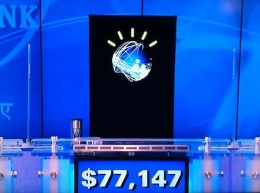 It was all fun and games when IBM built Deep Blue to best Garry Kasparov at chess. Chess is, fundamentally, a mathematical game, so constructing a machine to out-calculate one of the greatest chess players in history just showed off IBM’s computer manufacturing prowess. When IBM unveiled Watson and set it loose on Jeopardy, things got a little murkier. Defeating Ken Jennings was a neat trick, but what was the practical application of an irritating know-it-all?
It was all fun and games when IBM built Deep Blue to best Garry Kasparov at chess. Chess is, fundamentally, a mathematical game, so constructing a machine to out-calculate one of the greatest chess players in history just showed off IBM’s computer manufacturing prowess. When IBM unveiled Watson and set it loose on Jeopardy, things got a little murkier. Defeating Ken Jennings was a neat trick, but what was the practical application of an irritating know-it-all?
Obviously, the practical application would be “winning the upcoming Above the Law trivia challenge,” but so far Watson hasn’t volunteered for that event.
Now IBM has unleashed Project Debater, their least cleverly named project yet, to compete against a fair of debaters in two short formal debates on telemedicine and space exploration. The format, adapted from the British style that favors smug asides over cold hard facts, allowed Debater to show off its ability to scour the web and turn logic and evidence into bad analogies. For some reason, we’re supposed to celebrate this. From Motley Fool:

Why Your Practice Is Burning Money And How You Can Do Better
Our expert panel explores common sources of profit leakage along with practical steps for improvement.
The computer apparently “held its own” against these formidable opponents, winning over some audience members and even cracking a few jokes along the way. “There is a lot at stake today … especially for me,” Debater quipped. Its analogies were also impressive: “Subsidizing space exploration is like investing in really good tires. It may not be fun to spend the extra money, but ultimately you know both you and everyone else on the road will be better off.”
But no one believes that IBM is looking to crash the global debate party any more than they thought Watson was gunning for the high-stakes trivia sector. With its latest publicity stunt, IBM is signaling to the world that it thinks it’s created an algorithmic arguer, and the markets for professional argument are pretty limited to lawyering and hosting a drive-time sports call-in show.
That’s not to say that Debater doesn’t perform some amazing functions.
First, the computer must interpret human speech with advanced voice recognition technology. Then, Debater scans a database of millions of academic papers, news articles, and other written pieces on the topic, sifting out relevant passages that pertain to the argument at hand. Another step entails the computer eliminating repetitions in these passages, before finally interpreting them and forming an argument. Debater can even take things a step further, giving itself a confidence score, then debating either more forcefully or not, depending on how confident it is in its argument

Pursuing The Pro Bono Story: A Conversation With Alicia Aiken
This Pro Bono Week, get inspired to give back with PLI’s Pursuing Justice: The Pro Bono Files, a one-of-a-kind podcast hosted by Alicia Aiken.
But is Debater really what the legal market needs out of an AI-assisted argumentation tool? No one’s really looking for a terminal to handle oral argument, they’re looking for a product like Casetext’s CARA or ROSS’s EVA, something that helps attorneys construct briefs by leveraging AI. And many of the research functions that Debater is showing off here are functions those products are already getting into. Taking it further than that just feels more like the makings of a live-action Jetsons reboot.
In past conversations, IBM has suggested to me that they might one day be able to map the brains of great legal minds and license these electronic clones to clients. Putting aside the fact that no state bar in the world will authorize this as the practice of law, it misses out on what lawyers really do need from AI. They need machines to perform research, writing, organization, comparison, and analysis. Debater demonstrates that IBM has the tech to perform these critically important tasks — but it just seems like IBM can’t bring itself to build something as unsexy as a focused business application to perform due diligence.
As the investing gurus at Motley Fool note, this unwillingness to “dream smaller” may be IBM’s problem:
That doesn’t exactly scream “disruptive technology” to investors, especially seven years after the Jeopardy! success.
There are several possibilities as to why. One, some have wondered how differentiated Watson is compared with other artificial intelligence services from Silicon Valley companies both large and small. Second, IBM has tried to apply Watson to incredibly difficult problems, such as diagnosing cancer. Since collecting all the relevant medical data is challenging, delays in breakthroughs have tested investor patience. Finally, the fact that IBM has been hyping the technology for years, yet doesn’t disclose how much money it makes specifically from Watson applications, probably doesn’t help matters.
Perhaps it’s time for IBM’s senior leadership to ask Debater to play Devil’s Advocate and argue against the company’s long-term AI strategy. I think there’s more than enough material out there to give the system a strong case.
IBM’s Debater: Your Next Lawyer? [Motley Fool]
 Joe Patrice is an editor at Above the Law and co-host of Thinking Like A Lawyer. Feel free to email any tips, questions, or comments. Follow him on Twitter if you’re interested in law, politics, and a healthy dose of college sports news.
Joe Patrice is an editor at Above the Law and co-host of Thinking Like A Lawyer. Feel free to email any tips, questions, or comments. Follow him on Twitter if you’re interested in law, politics, and a healthy dose of college sports news.